In the framework of the centenary celebration series “12 months, 12 resolutions”, this month it is time to highlight the importance of table grapes and its evolution in the OIV works.


On the path of almost a century, the production of table grapes has always been an important topic at the OIV, treated by the Sub-Commission “Table grapes, Dried Grapes and Unfermented Products”: SCRAISIN. (know more about the OIV structure here).
Since its constitution, the SCRAISIN is aimed at developing projects of resolutions, surveys, and expertise collective documents for a sector with a significant economic relevance in many OIV Member States.
In this historical framework, one of the first greatest standards is represented by the OIV RESOLUTION AG 13/54-VIT “Definition of table grapes, improvement of technology methods, standardisation and marketing of table grapes”. Adopted by the 34th OIV General Assembly, hold in Paris in September 1954, the resolution defined the following:
“Table grapes are the fruit of the vine intended primarily for consumption in nature and produced by special grape varieties or cultivated for this purpose”.
In the same resolution, the OIV delegates established important decisions, such as:
-
the recognition that the improvement of technological methods is a national or regional issue,
-
as for the standardisation and marketing of table grapes, with the aim of establishing an uniform international nomenclature for exported grape varieties, only an exclusive list of table grape varieties intended for export should be taken into consideration (excluding varieties intended for domestic consumption),
-
the adoption of a maturity standard, expressed by the ratio g/l of sugars (glucose and levulose) and g/I of acidity (tartaric acid).
Furthermore, the General Assembly advised to ratify the United Nation’s recommendations concerning the qualitative classification of the table grapes in three categories and requested a consultation of the Member States exporting table grapes, to establish the most appropriate types of packaging.
Based on such decisions, over the following 70 years the OIV had the tools to play a crucial role by developing important exchanges with other international organisations (like Codex Alimentarius) and by establishing further standards, especially on trading aspects (see OIV Resolution VITI 1/2008).
The activities developed by SCRAISIN
By Luis Peres de Sousa, President of the Sub Commission SCRAISIN
Making an analysis of the last 70 years, after the publication the OIV resolution AG 13/54-VIT, we observe an enormous work and commitment of all the experts and the SCRAISIN structure in different actions:
-
firstly, focused on table grapes for fresh consumption,
-
followed over time by raisins (which have high food value),
-
and lately with a focus on grape juice, in accordance with Resolution OIV-VITI 654-2021 “OIV guidelines for the sustainable production of grape juice, concentrated juice and for processing”, and the Resolution OIV-VITI 678A-2022 “Definition of grape nectar and carbonated grape nectar”. These resolutions reflect the importance of this products in human health, corroborated by the actions underway, in collaboration with the OIV’s Safety and Health Commission.
Since SCRAISIN deals with products for human consumption, namely: fresh table grapes, raisins and grapes for grape juice, reducing the use of pesticides has always been a concern of the experts.
This concern is currently expressed through the use of new technological tools, such as physical means, to eliminate fungi, as well as through ongoing actions, such as the organic production of table grapes, and the elimination of the use of synthetic pesticides. These factors also meet other issues as:
-
sustainability (impacts on biodiversity and ecosystems, microbiomes); economic (production costs; vine dormancy and the impact of climate change; efficient use of water; use of mechanical harvesting technology for raisins in some specific situations and its impact on the quality of the product for the market);
-
and social impact (working conditions).
Challenges and opportunities for SCRAISIN
By Rodrigo Espindola, OIV Expert of the Argentinian Delegation in Sub Commission SCRAISIN
Global warming produces new challenges for scientists, experts, advisers and farmers of dried and table grape production community. The main issue turns around economic, social and environmental sustainability. Nowadays consumers request safety, quality and good nutrition without negative impacts on health. Therefore, the sector is applying new approaches based on good agricultural and manufacturing practices. The OIV Sub Commission SCRAISIN will attend such demands with a sustainability criterion by providing new recommendations, standards, and promoting new research results and new indexes. This must be accompanied with the revision of the previous OIV Resolutions and the need of giving significant answers to the population and new consumers aiming to avoid unsafe food.
Furthermore, the SCRAISIN must support and promote sustainable and innovative non-alcoholic products to put into value in the market, answering the consumers´ demand. As stated, 70 years ago, the idea that all Member-States are not the same should be remarked by encouraging to apply different technologies. The OIV Countries have different cultures, but all together are complementary and contribute to better results, better uses of resources and the development of the dried and table grape production.


